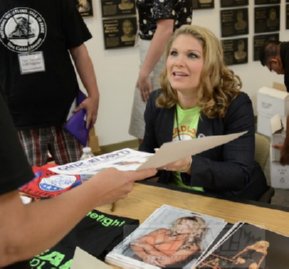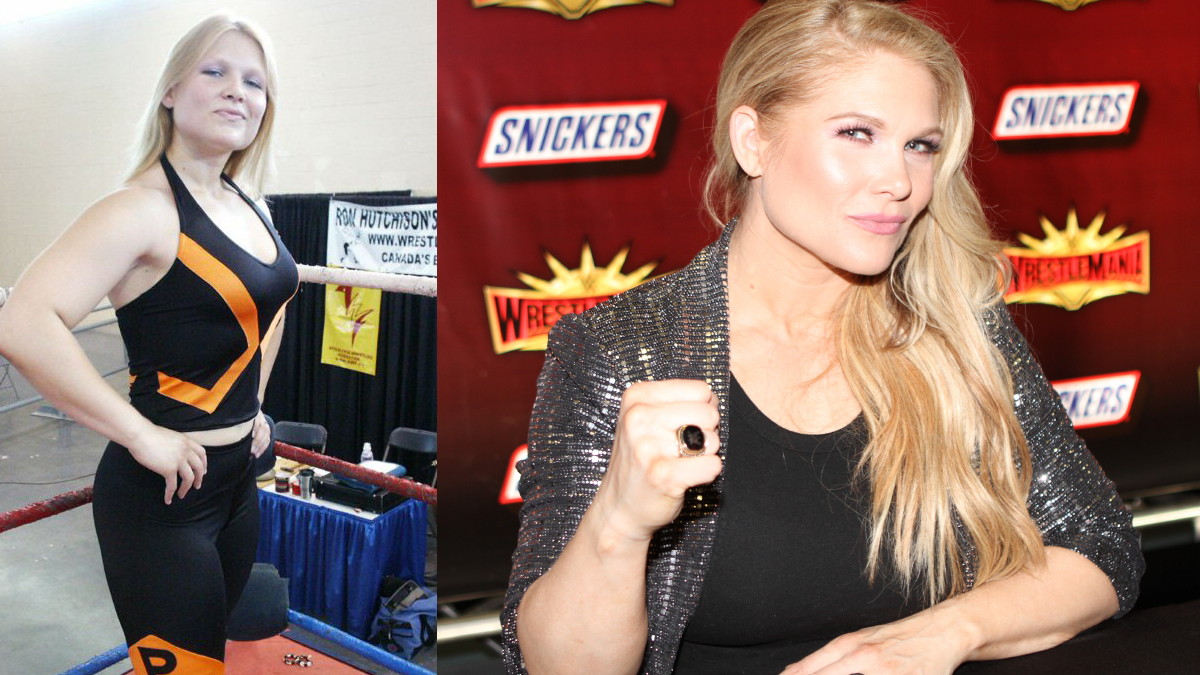While Beth Phoenix’s days as the Glamazon are in the past, she hopes her contributions to professional wrestling — and those of the women who come after her — lead to a better world for her daughter.
Phoenix’s accolades in the ring, and her volunteer work out of the ring, earned her the 2015 Frank Gotch Award, issued by the George Tragos/Lou Thesz Professional Wrestling Hall of Fame. As one of the first female recipients of the award that recognizes athletes promoting a positive image of professional wrestling through work beyond the mat, she said she feels like “the world is changing a little bit.” (Penny Banner received the award in 2008.)

Beth Phoenix signs an autograph. Photo by Joyce Paustian
“I feel like the era of the kick-ass girls — excuse my language — is kind of entering the fold a little bit,” Phoenix said. “You’ve got a Ronda Rousey, you’ve got Jennifer Lawrence in Hunger Games and you’ve got these leading women in entertainment that are kind of coming forward and creating great examples for women.”
Now a mother to 18-month old Lyric, Phoenix said she views the world differently because when she was breaking in to wrestling, “there were very few women like that.”
“I feel so proud and so happy that if in any tiny way I can contribute to the world being a more girl-power friendly place,” Phoenix said. “I’m so grateful for that, and I hope that I represent enough so that the world my daughter grows up in is more accepting and more willing for girls that want to get out there and kick booty and not feel held back by their gender.”
Phoenix works with Headlock on Hunger (a division of Eblen Charities), Mission Hospital Volunteer Department and the “I Have a Dream” Foundation.
Eblen Charities CEO Bill Murdock has known Phoenix for a few years, but first met Adam “Edge” Copeland, father to Lyric. Headlock on Hunger was created last September and, according to Murdock, Phoenix and Copeland are among those who assist in delivering food to schools and other places in need.
“They’re not just lending their name and their celebrity to (the effort), but they’re very much hands on,” Murdock said.
Phoenix “personifies what the Frank Gotch Award is,” according to Murdock, and there couldn’t have been a better choice — male or female. The Eblen Charities CEO said he hopes Phoenix’s recognition will encourage not only other female wrestlers, but those in the wrestling community as a whole, to perform similar public services.
“There could be no better recipient, and she certainly has raised the level of the award for everyone else who is yet to come,” Murdock said.
Regardless, Phoenix said her initial reaction to the honor was “unworthiness.”
“It was shocking to me because when I saw the list of names of other folks that have come before me … These are legends that have wrestled for decades and worked through some of the most successful times in pro wrestling — the Attitude Era — and also gentleman that have done amazing things beyond wrestling,” Phoenix said.
Diamond Dallas Page has given his time through charitable work with his yoga program, DDPYoga, and Mick Foley, according to Phoenix, has done “some amazing work” with RAINN, an anti-sexual assault organization. Both received the Frank Gotch Award earlier, Foley in 2010 and DDP in 2014.
Not like the other girls
Phoenix said she hopes being bestowed with the Gotch Award means the state of women’s wrestling is growing. When she began in both her amateur and professional careers, she said the opportunities were fewer, and she wanted her approval to go beyond gender.
“I didn’t want to be accepted as, ‘You’re good for a girl.’ I wanted to be, ‘You’re a good wrestler, not a good girl wrestler,'” Phoenix said.
During her Tragos/Thesz Hall of Fame induction speech, Phoenix said one of her “finest moments” in WWE came when she entered the 2010 Royal Rumble — an opportunity championed by Dean Malenko.
“Dean giving me that opportunity in the Royal Rumble to show what I had and to compete on a level equal with men truly was the greatest moment in my wrestling career,” Phoenix said.
But in working toward that acceptance, Phoenix said she struggled with not looking like other women in the business. That altered her journey into a battle of proving herself valuable instead of “squashing (herself) into a mold that they thought they needed.”
“I was bigger, I was thicker, and they didn’t want that,” Phoenix said, “and they kept telling me they didn’t want that and that’s not what they were looking for.”
WWE Women’s champ Beth Phoenix on WrestleMania weekend in 2008, in Orlando, Florida. Photo by Mike Mastrandrea.
Prior to that hurdle, her biggest obstacle was simply getting noticed, as she had to physically go to shows and meet people — a scary and intimidating experience.
“I was a shy kid from a small town, and I got to go to a Smackdown show, and I open up the door — I was invited as an extra — and the first person that I smacked into is Brock Lesnar,” Phoenix said. “And I mean I’m terrified. He must have seen this look on my face that terrified him too, like, ‘What is wrong with this kid?'”
Beth Phoenix in 2001, early in her career. Photo courtesy Apocalypse Wrestling Federation
‘A naïve perspective’
A lifelong fan of wrestling, Phoenix said from “a naïve perspective,” she assumed amateur wrestling led to professional wrestling, prompting her to pursue the amateur route.
“I ended up being on the boy’s team, which then showed me (and) gave me a new respect for how much harder I had to work to succeed in a sport where I was physically at a disadvantage because I was a girl,” said the former Glamazon, who spent more hours in the gym and more hours studying to even “exist on the team.”
Though she began lifting weights at age 13, Phoenix said she faced physical and mental challenges because she wasn’t a born athlete.
“I know it sounds funny, but I’d see the ICOPRO commercials, and you see Razor (Ramon) and Bret (Hart) lifting weights, and I’m like, ‘Well, I better pick up a weight. That’s what they’re doing. That’s how they get their muscles,'” Phoenix said.
The Tragos/Thesz Hall of Fame and Dan Gable Museum combine professional and amateur wrestling, which Phoenix said relates to her “initial naïve interpretation” of how the wrestling world operated.
“There’s so many tremendous amateur wrestlers that really just transitioned into pro wrestling phenomenally — Kurt Angle, Brock Lesnar. There’s a long list of some of the most successful guys, Jack Brisco and Jerry, that really just picked it up, you know?” Phoenix said. “And I think that the reason is the type of person, the type of grit it requires to succeed in amateur wrestling is very akin to what pro wrestlers need.”
The Fabulous Firebird Phoenix wrestles “The Bombshell” Macaela Mercedes (later Jillian Hall) in Toronto for the Apocalypse Wrestling Federation in November 2002. Photo courtesy Apocalypse Wrestling Federation
In her own transition from amateur to the pro ranks, Phoenix said she was “bumping around in the dark,” and eventually landed in Toronto with Ron Hutchison’s Apocalypse Wrestling Federation.
Hutchison said Phoenix made her AWF debut in 2002 with a “crazed fan out of the stands gimmick,” then transitioned to wrestling. He said while “she was green,” she would “travel anywhere and everywhere they had a wrestling ring” to improve her skills.
“She could really wrestle if she had to — a trait I absolutely loved, by the way — she was cute, she was very strong, and often did spots where she’d lift two guys into the air, and, boy, was she ever entertaining,” Hutchison said.
Despite the recognition Phoenix has already garnered, Hutchison said her “greatest contribution may be yet to come.” But as of her accomplishments thus far, she has brought “class and respectability” to the profession.
“She stayed true to herself and her principals and managed to live her dream and by doing so, I know for a fact, (she) became a role model to a lot of young girls,” Hutchinson said. “To be able to reach out and be a positive role model, knowingly or not, is perhaps one of the greatest contributions that anybody could hope to achieve.”
RELATED LINKS

